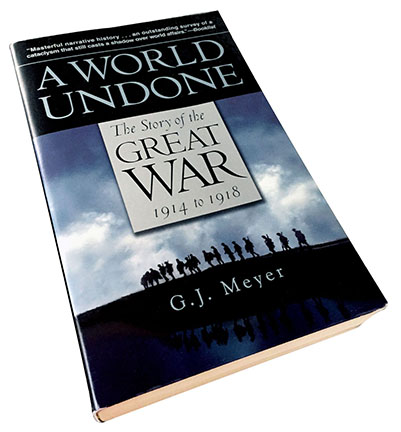A World Undone: The Story of the Great War

Great overview of World War I
By Mike From Mesaon - March 16, 2013
Like most people today World War II has always been more immediate to me than World War I. It is not a matter of the years' removal from the war as much as the events themselves. The immediate causes of World War II were clear from the rise of Nazism in Germany to the invasion and attempted subjugation of China by Japan while the causes of World War I were more obscure. Further, the results of the second war, from the division of Europe through the rise of an essentially unarmed Japan, are still part of yesterday's headlines while the immediate results of World War I (the Weimar Republic, the occupation of the Rhineland, the Free City of Danzig) are essentially hidden in the mists of history. Because of this I have long looked for a clear explanation for the start of World War I as well as an overview of the war itself.
I had long heard about the terrible loss of life in that war without really having a good understanding of the "hows" and "whys" of the war itself. Added to this problem was my lack of understanding of exactly how the old structure of Europe, now long gone, either caused or contributed to the causes of this war. I had read other books to try to understand this terrible tragedy (The Guns of August and The Zimmerman Telegram by Barbara Tuchman, World War I by John Keegan and others) but never felt as though I had an understanding of the events until I finally I found Mr Meyer's wonderful book. First I need to state that this review is for the Kindle version of A World Undone and some of these comments may not apply to the print version.
As my interest was for more of an overview of the war rather than a detailed account of the battles this book served my needs perfectly. It covered the war from the assassination that triggered it through the collapse of the German Army in 1918 without ever descending into the troop movement details more than absolutely necessary. All the important battles are covered as are the political events behind them but, just as importantly, it covers the backgrounds of the people and political entities involved so as to make the actual events much more understandable.
The trigger for the war was the assassination of the Arch Duke Ferdinand by Serbian nationalists. Why was Serbia so antagonistic toward the Austro-Hungarian Empire? And why were the Balkans such an unstable area? These questions, and more, were covered in the background chapter on Serbia.
Why was no one able to stop the war from actually starting, given the month and more between the assassination and the declarations of war? Explained in the first chapters of this book.
Why was there such bad blood between the German and French/British governments? Explained in the background chapter on the Hohenzollerns.
Why was the Austro-Hungarian Empire so weak? Explained in the background chapter on the Hapsburgs.
Why did the war go on for so long? And why were both the British and French generals unable to react more quickly? Explained in the background chapters on the British and French generals. And so on throughout the book.
In short this book provided me with a level of background detail that allowed me to understand the events that were happening at that time. No other book on World War I that I had read gave me anything as nearly complete and hence no other book gave me the ability to properly understand what happened.
This book is, quite simply, the best book on the period that I have ever read unless someone wants much more detail on the individual battles and troop movements. If you want battle details John Keegan's book might be better, but as an overview of the war this book is the best I have ever seen.